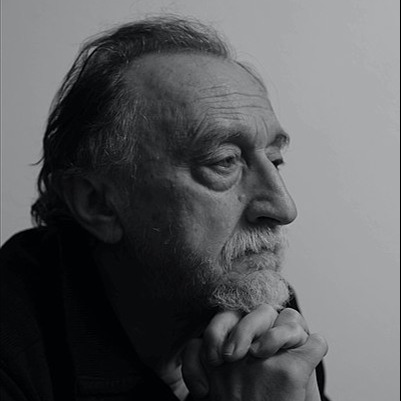
Boris Mikhailov
Boris Mikhailov is a Ukrainian photographer and artist, known for his provocative and often controversial depictions of life in the Soviet Union and post-Soviet Ukraine.
Biography of Boris Mikhailov
Boris Mikhailov, born in Kharkiv, Ukraine, in 1938, stands as a seminal figure in contemporary photography. His early life was marked by the stringent realities of Soviet rule, shaping a career that would become profoundly engaged with social and political critique. Initially, Mikhailov pursued a conventional path, earning a degree in engineering and subsequently working as a factory photographer in Kharkiv. This position allowed him a unique vantage point on the everyday lives of Soviet citizens, which would later become a central theme in his work.
Mikhailov's transition to full-time photography was catalyzed by a dramatic personal event: the KGB discovered nude photographs of his wife, leading to his dismissal from his engineering job. This incident marked a turning point, propelling Mikhailov into a dedicated exploration of photography. Teaching himself the medium's technical and artistic aspects, he began to develop a distinctive style that combined conceptual art with social documentary.
From the mid-1960s onward, Mikhailov's work began to gain recognition for its unflinching portrayal of life under and after Soviet rule. His photographs captured the stark realities and underlying absurdities of the social order, often infused with a dark, ironic humor. This period saw him producing several significant series, each offering a critical commentary on the socio-political landscape of the time.
In the decades that followed, Mikhailov's work expanded in scope and influence. After the collapse of the Soviet Union, he turned his lens on the chaotic transition to a capitalist society, documenting the resultant social upheaval and economic disparity. His series "Case History" (1997-1998), which chronicles the lives of homeless individuals in post-Soviet Ukraine, stands as a poignant testament to these turbulent times.
Mikhailov's commitment to exploring the human condition through photography has earned him international acclaim. His ability to convey the complexities of life in Eastern Europe, combined with his innovative approach to the medium, has made him one of the most influential photographers of his generation. Despite the challenges and controversies he has faced, Mikhailov's work continues to provoke thought and inspire dialogue, solidifying his legacy as a crucial voice in contemporary art.
Challenging Norms and The Irony of Truth: Boris Mikhailov’s Art Style
Boris Mikhailov's artistic style seamlessly blends conceptual art with social documentary photography, addressing controversial and challenging subjects with a unique, often provocative approach. His early series, such as "Red" (1968-1975), utilized the color red to symbolize the omnipresence of communist ideology in Soviet life. This series not only highlighted the pervasive influence of the regime but also served as a subtle critique of its totalitarian nature.
Another example of color conceptualization is Boris Mikhailov's "Green" series. In this body of work, Mikhailov uses the color green to symbolize the ubiquitous presence of state control and the veneer of prosperity in the Soviet Union. Through these vibrant yet unsettling photographs, Mikhailov critiques the superficial gloss of Soviet propaganda and exposes the harsh realities lurking beneath the surface. His use of green serves as a metaphor for both the promises of socialism and the environmental degradation resulting from industrial policies.
Mikhailov's work frequently incorporates explanatory notes, diary-like text, and deliberate flaws, subverting traditional photographic aesthetics and the glorified imagery of Soviet propaganda. This method is evident in series like "Yesterday's Sandwich" (1965 onwards), where he juxtaposes beauty and ugliness to create a dual reality that is both ambiguous and poetic. Similarly, in "Luriki" (1971-1985) and "Sots Art" (1975-1986), he cynically reflects on how propaganda images artificially idealized reality.
One of Mikhailov's most notable works, "Case History" (1997-1998), provides a raw, unflinching look at the lives of the homeless in post-Soviet Ukraine, highlighting the stark contrasts and failures of the new capitalist society. This series was first exhibited in Berlin and later in major institutions around the world, cementing Mikhailov's reputation as a critical observer of social change.
Mikhailov often uses humor, irony, and self-criticism as tools of subversion. In series like "I Am Not I" (1992) and "National Hero" (1992), he employs provocative self-portraits to critique societal norms and his own identity.
Through his innovative techniques and fearless exploration of difficult subjects, Boris Mikhailov has redefined the boundaries of contemporary photography, making significant contributions to both conceptual and documentary art. His work continues to provoke thought and inspire dialogue, reflecting the complexities of life in Eastern Europe and beyond.
Exhibitions and Recognitions of Boris Mikhailov
Mikhailov's exhibitions have been featured in prestigious venues such as the Museum of Modern Art (MoMA) in New York, Tate Modern in London, and others. His work was prominently displayed in the solo exhibition "Before Sleep/After Drinking" at C/O Berlin Foundation in 2019 and "Temptation of Death" at Maison Européenne de la Photographie, France, in 2022. Additionally, his contributions to group shows like "Another Kind of Life: Photography on the Margins" at the Barbican Centre, London (2018), and the 5th Odessa Biennale (2017) further showcase his influence and reach in the art world.
Mikhailov's work is included in major public collections around the world. These institutions include the Hamburger Bahnhof in Berlin, the Museum of Contemporary Photography in Chicago, the San Francisco Museum of Modern Art, the Stedelijk Museum in Amsterdam, Tate Modern in London, the Tel Aviv Museum of Art, the Metropolitan Museum of Art, and MoMA in New York.
Years:
Born in 1938
Country:
Ukraine, Kharkiv